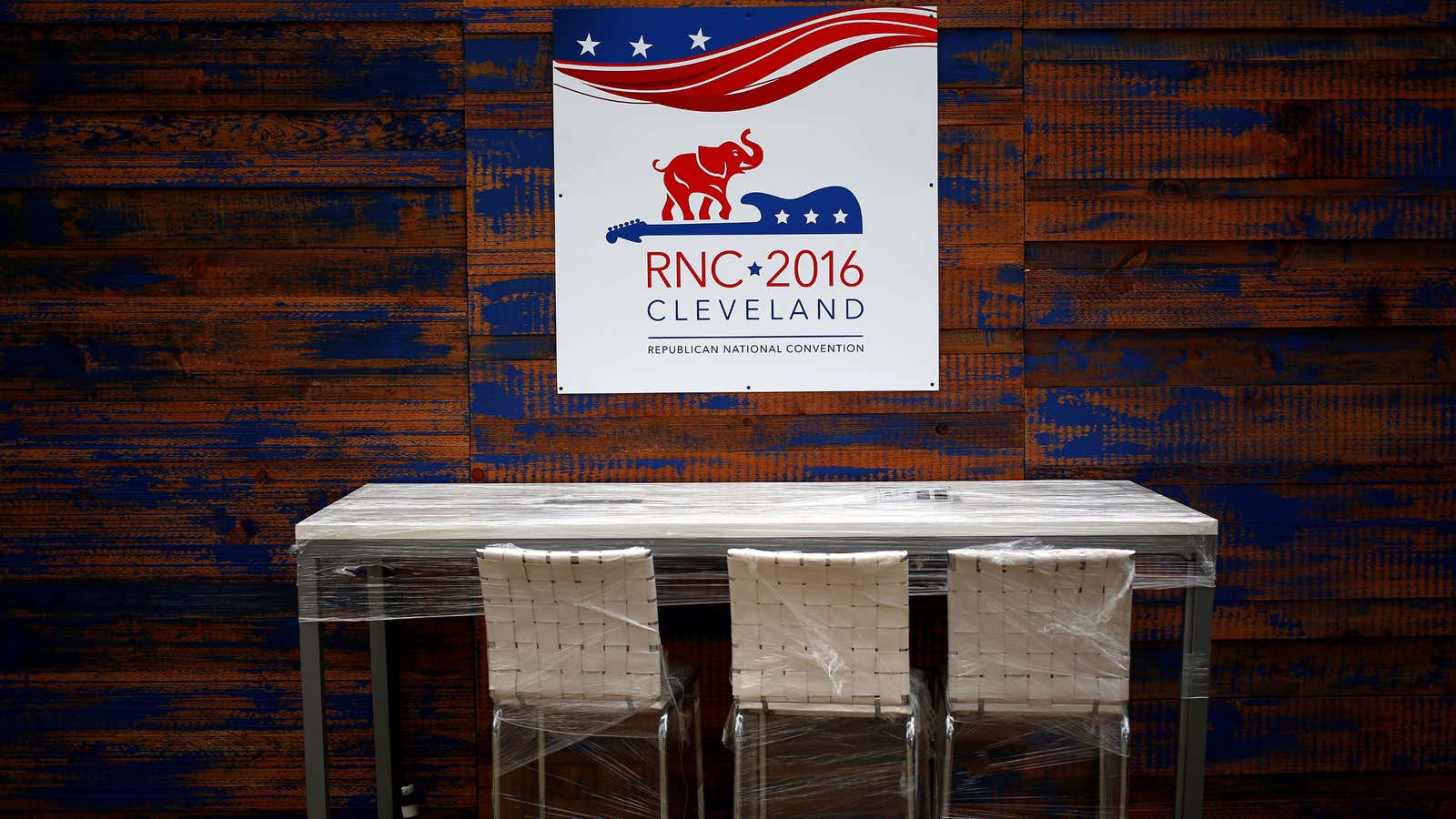Cleveland
The itinerary of extravagant receptions and swag-filled hospitality tents that normally make conventions a boozy junket for delegates and DC inhabitants alike have a different feel this time around.
Inside one such tent, a white one just a hundred yards from the convention arena, attendance was spotty. Delegates who would normally fuel up with free drinks (brought to you by the American Association of Manufacturers) ahead of the third night of speeches were absent. Even the presence of a larger-than-life 3-D printed Trump bobble-head couldn’t drum up a crowd.
Earlier, at Cleveland State University, representatives of a variety of high-tech industries—from biotech to video games, from Microsoft to Facebook—met at the Republican National Convention to talk about how to boost their fortunes.
They gathered for a discussion hosted by a bipartisan DC think tank, and were joined by several Republican members of Congress. The attendees focused on their policy hopes and dreams—for trade deals to protect US intellectual property abroad, for high-skilled immigration to bolster innovation, more investment in fighting foreign hackers, and a more adult conversation about complex topics like drug prices, genetically-modified organisms, artificial intelligence and data privacy.
But they seemed to want to stay away from their fears. It took thirty minutes for Donald Trump’s name to come up, and it was only in passing. Even if you set aside the hateful sentiments that have led some tech leaders to oppose Trump, their reticence can be explained: Trump has spoken out against those policies, lambasting the Trans-Pacific Partnership (TPP) and immigrants of all stripes and suggesting that GMOs will screw up your brain.
Indeed, Trump’s reach continues to exceed his grasp. Asked about electronic attacks from abroad yesterday, the candidate told the New York Times that “cyber is absolutely a thing of the future and the present.”
Asked by a reporter to address Trump’s record after the discussion, one member of Congress suggested that Trump was speaking in generalizations that wouldn’t reflect his ultimate policies.
“I don’t think you can make the broad statement that Mr. Trump’s policies are anti-innovation,” Republican representative Blake Barenthold of Texas said. “I do think the platform shows a tech friendly direction, and I believe Mr. Trump is going to follow that.”
But platforms are rarely a sign of surety in politics; Barenthold himself noted that only three kinds of people read them—the people who write them, political opponents, and the press. But the Texan suggested Trump’s plan to renegotiate trade deals to benefit the US would boost the fortunes of the tech sector.
Minutes before, Jim Greenwood, the CEO of the Biotech Innovation Organization, warned that re-negotiating a deal like the TPP would not be as simple as Trump makes it sound. Though his organization no longer backs the trade deal thanks to a compromise on monopoly protections for biologic drugs that also has critics up in arms, he doesn’t fault US negotiators.
“We need to be careful about our expectations of the next administration,” Greenwood says. “The counter-pressures are extraordinary…it’s not because our negotiators have been stupid, it’s because it’s really hard-fought stuff.”
The lobbyists took a more practical approach: Look to anyone else in government to reign Trump in should he be elected. At their private receptions, the focus is on raising money for anyone but Trump. Noting elections at virtually every level of government, Mike Gallagher, the CEO of the Entertainment Software Association, says ”that shared leadership is where the real deal is.”
“Campaigns are written in poetry, and government is written in prose,” Greenwood said. “I will rely on my friends and colleagues in Congress to help him write the prose.”
That ambivalence has led to a much smaller presence than normal at the Republican convention according to many veterans of the influence industry, who say conventions are typically a time where corporate cash flows freely, major tech companies provide free infrastructure, and Fortune 500 CEOs hobnob publicly.
“It seems half as much, a third as much, much more low key,” Robert Atkinson, the head of the Information Technology and Innovation Foundation, host of the Cleveland State event, said. “A number of companies are explicitly sitting to the side. There’s a different feel.”
Of course, the convention is crawling with lobbyists—campaign chairman Paul Manafort liberally salted the floor with operatives from the network he’s built over decades of peddling influence. But it’s not clear that their clients care much to associate with nominee, even if they would normally back a Republican agenda of low taxes and regulation. Last week, Politico reported that corporate donors reneged on millions in donations to the convention, part of a parade blue-chip companies like Apple, BP, United Health, Visa, FedEx, Pepsi and Coca-Cola.
A new disclosure regime means we won’t find out who actually funded either party’s convention for months, until the revelations are all but immaterial. But major funding appears to be coming not from companies seeking influence, but from right-wing billionaires boosting their ideological preferences.
AAM, provider of those free drinks in the white tent, is an organization funded by the Steelworkers Union and manufacturing companies. Its leadership might be receptive to Trump’s made-in-America rhetoric and protectionist leanings. But as of right now, they don’t know what to expect from the Republican nominee.
“Trump hasn’t come out with anything,” Jet Moody, AAM’s press secretary, says. “He has some great talking points.”
Bottoms up.
